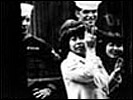History of Postwar Japan as Told by a Bar Hostess
- Year
- 1970
- Original title
- Nippon Sengoshi Madamu Onboro no Seikatsu
- Japanese title
- にっぽん戦後史 マダムおんぼろの生活
- Director
- Cast
- Running time
- 105 minutes
- Published
- 31 August 2001


by Jasper Sharp
"History is more or less bunk", the US industrialist Henry Ford was once famously quoted as saying. Well perhaps this is going a little far, but the maxim that history is written by the winners holds strong, and as such it is open to distortion and abuse. As George Orwell wrote in the novel 1984, "Who controls the past controls the future; who controls the present controls the past".
So where does one look for a truthful account of the history of post-War Japan? Do we rifle through hours and hours of contemporary newsreel footage, keeping fully in mind that not only was it commissioned by the various news agencies working under the aegis of the Japanese government, but also that all film had to be subjected to further scrutiny and possible suppression by The American Occupation's Civil Information and Education Section of the time? (In 1946 the Americans set fire to a huge pile of films, mainly wartime dramas, that fell under the 13 subjects forbidden by the occupying forces) Or is it better to rely on personal accounts from those that have lived through the period - a bar hostess, perhaps - when we know that each individual history is bound to have a different take on events from the next?
The fact is that history is highly subjective and always based on a unique individual interpretation. Furthermore, when it comes to the cinematic portrayal of reality, the role of editing and the arrangement of the visual source material are just as important as the sources used in getting the point across. The medium and the message are inextricably linked and as such, all attempts at chronicling history in order to get to the heart of "objective truth" cannot help but be compromised by the artistic selection process deployed by the individual filmmaker.
History of Postwar Japan as Told by a Bar Hostess tackles these issues head on. Firstly it provides an alternate voice to the "official" history writers in that the film's narrative backbone is provided by Onboro-san, the bar hostess / prostitute of the film's title, and secondly, its candid and straightforward approach to the laying-out of its material deflects any alternative reading. Imamura's documentary is what it says it is. It has no hidden agenda.
Director Shohei Imamura had already experimented with the limitations of the documentary format a few years earlier with his A Man Vanishes (Ningen Johatsu, 1967). With the later financial failure of his epic anthropological exploration into the origin of the modern Japanese psyche, Profound Desires of the Gods (Kamigami no Fukaki Yokubo, 1968) he retreated back into a smaller scale of filmmaking, stripping away all cinematic artifice to make something rawer - or as he once stated "more and more direct, less and less constructed". Having come full circle with the arrangement of dramatically staged scenes within the confines of the dramatic feature, he went back to basics to explore the use of unmediated documentary in order to find that Holy Grail of cinematic realism.
Imamura's intention was to make a film about the sort of people who were tied up in the events following the war but who had little influence on them, nor any vested interest in the decisions made by the higher echelons in the name of the Japanese Nation. These members of the lower castes have been seldom given a voice or means of expression, yet to Imamura represent the very essence of the Japanese spirit.
The approach here sees our subject, Onboro-san, seated in front of a projection screen by the director (as in A Man Vanishes, no attempt to is made to conceal Imamura's editorial presence within the film) to deliver her own personal life story against a succession of newsreels that begins with the bombing of Hiroshima (which happened when our narrator was 15), and goes on to detail such major events in the nation's history as the end of World War 2, the US Occupation, the repatriation of Japanese prisoners of war from Russia, the Korean War, the Vietnam War, student protests, etc. - a potted sequence of national events running up until the year the film was made.
Our earthy narrator Onboro-San, with her hair piled up in a makeshift beehive and bosom heaving beneath an open blouse makes for an unsophisticated yet personable hook into the events onscreen. The director discovered his subject in a bar for gaijin in Yokosuka. "It was the kind of place were no one had any family outside the bar itself... Scorning Japan and the Japanese, they seek the company of strangers, only to find GIs or American sailors," he said in a 1977 interview with Max Tessier. She is typical of the type of female leads in the director's fictional dramas. She is the sort of character that if Imamura hadn't found her, he would have probably made her up anyway.
Few concessions to cinematic technique are used to engage the audience's attention in this raw looking film, which instead relies wholeheartedly on its subject matter. What we have here is essentially two interconnected narratives, consisting of an image track of newsreel footage and Onboro-san's running commentary on the soundtrack prompted by Imamura's questioning as she outlines her own personal history against the nation's turbulent timeline. This is sporadically interspersed with interviews with her family and children.
Early footage of a black market abattoir is given added weight by Onboro-san's reminiscences of her own experiences in these days of food shortages and racketeering. Occasionally she contradicts the "official" footage ("It never happened like that!"), and provides some surprising revelations too: for example, that the GIs she knew were actually very kind and "gentlemen", and in fact very popular with her and her girlfriends. This last statement runs against most fictional representations of the occupying forces, for example in the ultra-nationalistic writings of Yukio Mishima, or portrayals of GIs in films such as Seijun Suzuki's Gates of Flesh (Nikutai no Mon, 1964) or Tetsuji Takechi's Black Snow (Kuroi Yuki, 1965). In fact, the film ends with Onboro-san just about to leave with her new soldier partner for America. She is philosophical about her new life, hinting that she probably won't stay very long, but almost seems to be tagging along with her new man for the ride, the latest adventure of many in a string of different partners by whom she has had a number of children.
Throughout the film, Imamura keeps a close rapport with his subject, aided by his familiarity with her milieu, so though it's been hinted elsewhere that the film is in fact faked, even if the veracity of Onboro-san, her family and her story is in doubt, it's all of secondary importance to the message that Imamura is trying to get across. It merely serves to underscore the point that fiction is arguably a more potent and truthful way of approaching historical events than documentary. By eschewing all pretensions of realism and objectivity falsely engendered by the documentary format, it can come closer to the heart and the spirit of what it is trying to portray than by limiting itself to a "realistic" perspective.
Imamura continued his self-imposed exile from the world of feature filmmaking for the best part of the 1970s, successfully returning in 1978 with Vengeance Is Mine (Fukushu Suru wa Ware ni Ari) after a string of TV documentaries, including the three-part In Search of Unreturned Soldiers, (Mikikanhei o Otte) about the war veterans who didn't bother coming back to their homeland after the war had ended.